
- Bioactive Compounds
- By Signaling Pathways
- PI3K/Akt/mTOR
- Epigenetics
- Methylation
- Immunology & Inflammation
- Protein Tyrosine Kinase
- Angiogenesis
- Apoptosis
- Autophagy
- ER stress & UPR
- JAK/STAT
- MAPK
- Cytoskeletal Signaling
- Cell Cycle
- TGF-beta/Smad
- Compound Libraries
- Popular Compound Libraries
- Customize Library
- Clinical and FDA-approved Related
- Bioactive Compound Libraries
- Inhibitor Related
- Natural Product Related
- Metabolism Related
- Cell Death Related
- By Signaling Pathway
- By Disease
- Anti-infection and Antiviral Related
- Neuronal and Immunology Related
- Fragment and Covalent Related
- FDA-approved Drug Library
- FDA-approved & Passed Phase I Drug Library
- Preclinical/Clinical Compound Library
- Bioactive Compound Library-I
- Bioactive Compound Library-II
- Kinase Inhibitor Library
- Express-Pick Library
- Natural Product Library
- Human Endogenous Metabolite Compound Library
- Alkaloid Compound LibraryNew
- Angiogenesis Related compound Library
- Anti-Aging Compound Library
- Anti-alzheimer Disease Compound Library
- Antibiotics compound Library
- Anti-cancer Compound Library
- Anti-cancer Compound Library-Ⅱ
- Anti-cancer Metabolism Compound Library
- Anti-Cardiovascular Disease Compound Library
- Anti-diabetic Compound Library
- Anti-infection Compound Library
- Antioxidant Compound Library
- Anti-parasitic Compound Library
- Antiviral Compound Library
- Apoptosis Compound Library
- Autophagy Compound Library
- Calcium Channel Blocker LibraryNew
- Cambridge Cancer Compound Library
- Carbohydrate Metabolism Compound LibraryNew
- Cell Cycle compound library
- CNS-Penetrant Compound Library
- Covalent Inhibitor Library
- Cytokine Inhibitor LibraryNew
- Cytoskeletal Signaling Pathway Compound Library
- DNA Damage/DNA Repair compound Library
- Drug-like Compound Library
- Endoplasmic Reticulum Stress Compound Library
- Epigenetics Compound Library
- Exosome Secretion Related Compound LibraryNew
- FDA-approved Anticancer Drug LibraryNew
- Ferroptosis Compound Library
- Flavonoid Compound Library
- Fragment Library
- Glutamine Metabolism Compound Library
- Glycolysis Compound Library
- GPCR Compound Library
- Gut Microbial Metabolite Library
- HIF-1 Signaling Pathway Compound Library
- Highly Selective Inhibitor Library
- Histone modification compound library
- HTS Library for Drug Discovery
- Human Hormone Related Compound LibraryNew
- Human Transcription Factor Compound LibraryNew
- Immunology/Inflammation Compound Library
- Inhibitor Library
- Ion Channel Ligand Library
- JAK/STAT compound library
- Lipid Metabolism Compound LibraryNew
- Macrocyclic Compound Library
- MAPK Inhibitor Library
- Medicine Food Homology Compound Library
- Metabolism Compound Library
- Methylation Compound Library
- Mouse Metabolite Compound LibraryNew
- Natural Organic Compound Library
- Neuronal Signaling Compound Library
- NF-κB Signaling Compound Library
- Nucleoside Analogue Library
- Obesity Compound Library
- Oxidative Stress Compound LibraryNew
- Plant Extract Library
- Phenotypic Screening Library
- PI3K/Akt Inhibitor Library
- Protease Inhibitor Library
- Protein-protein Interaction Inhibitor Library
- Pyroptosis Compound Library
- Small Molecule Immuno-Oncology Compound Library
- Mitochondria-Targeted Compound LibraryNew
- Stem Cell Differentiation Compound LibraryNew
- Stem Cell Signaling Compound Library
- Natural Phenol Compound LibraryNew
- Natural Terpenoid Compound LibraryNew
- TGF-beta/Smad compound library
- Traditional Chinese Medicine Library
- Tyrosine Kinase Inhibitor Library
- Ubiquitination Compound Library
-
Cherry Picking
You can personalize your library with chemicals from within Selleck's inventory. Build the right library for your research endeavors by choosing from compounds in all of our available libraries.
Please contact us at [email protected] to customize your library.
You could select:
- Antibodies
- Bioreagents
- qPCR
- 2x SYBR Green qPCR Master Mix
- 2x SYBR Green qPCR Master Mix(Low ROX)
- 2x SYBR Green qPCR Master Mix(High ROX)
- Protein Assay
- Protein A/G Magnetic Beads for IP
- Anti-DYKDDDDK Tag magnetic beads
- Anti-DYKDDDDK Tag Affinity Gel
- Anti-Myc magnetic beads
- Anti-HA magnetic beads
- Poly DYKDDDDK Tag Peptide lyophilized powder
- Protease Inhibitor Cocktail
- Protease Inhibitor Cocktail (EDTA-Free, 100X in DMSO)
- Phosphatase Inhibitor Cocktail (2 Tubes, 100X)
- Cell Biology
- Cell Counting Kit-8 (CCK-8)
- Animal Experiment
- Mouse Direct PCR Kit (For Genotyping)
- New Products
- Contact Us
c-Met
c-Met Products
- All (57)
- c-Met Inhibitors (46)
- c-Met Antibodies (7)
- New c-Met Products
| Catalog No. | Product Name | Information | Product Use Citations | Product Validations |
|---|---|---|---|---|
| S1068 | Crizotinib | Crizotinib is a potent inhibitor of c-Met and ALK with IC50 of 11 nM and 24 nM in cell-based assays, respectively. It is also a potent ROS1 inhibitor with Ki value less than 0.025 nM. Crizotinib induces autophagy through inhibition of the STAT3 pathway in multiple lung cancer cell lines. |
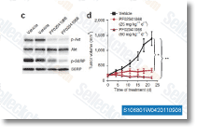
|
|
| S1119 | Cabozantinib (XL184) | Cabozantinib (XL184) is a potent VEGFR2 inhibitor with IC50 of 0.035 nM and also inhibits c-Met, Ret, Kit, Flt-1/3/4, Tie2, and AXL with IC50 of 1.3 nM, 4 nM, 4.6 nM, 12 nM/11.3 nM/6 nM, 14.3 nM and 7 nM in cell-free assays, respectively. Cabozantinib induces PUMA-dependent apoptosis in colon cancer cells via AKT/GSK-3β/NF-κB signaling pathway. |
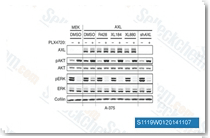
|
|
| S1112 | SGX-523 | SGX-523 is a selective Met (c-Met) inhibitor with IC50 of 4 nM, no activity to BRAFV599E, c-Raf, Abl and p38α. Phase 1. |
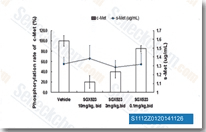
|
|
| S4001 | Cabozantinib malate | Cabozantinib malate (XL184) is the malate of Cabozantinib, a potent VEGFR2 inhibitor with IC50 of 0.035 nM and also inhibits c-Met, Ret (c-Ret), Kit (c-Kit), Flt-1/3/4, Tie2, and AXL with IC50 of 1.3 nM, 4 nM, 4.6 nM, 12 nM/11.3 nM/6 nM, 14.3 nM and 7 nM in cell-free assays, respectively. Cabozantinib malate (XL184) induces apoptosis. |

|
|
| S1111 | Foretinib | Foretinib is an ATP-competitive inhibitor of HGFR and VEGFR, mostly for Met (c-Met) and KDR with IC50 of 0.4 nM and 0.9 nM in cell-free assays. Less potent against Ron, Flt-1/3/4, Kit (c-Kit), PDGFRα/β and Tie-2, and little activity to FGFR1 and EGFR. Phase 2. |
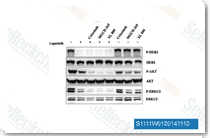
|
|
| S1070 | PHA-665752 | PHA-665752 is a potent, selective and ATP-competitive c-Met inhibitor with IC50 of 9 nM in cell-free assays, >50-fold selectivity for c-Met than RTKs or STKs. |
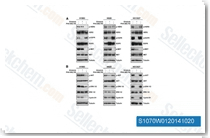
|
|
| S2788 | Capmatinib | Capmatinib is a novel, ATP-competitive inhibitor of c-MET with IC50 of 0.13 nM in a cell-free assay, inactive against RONβ, as well as EGFR and HER-3. Capmatinib (INCB28060) inhibits Wnt/β-catenin and EMT signaling pathways and induces apoptosis in diffuse gastric cancer positive for c-MET amplification. Phase 1. |
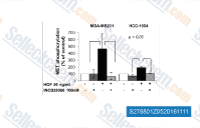
|
|
| S5190 | Crizotinib hydrochloride | Crizotinib (PF-02341066) hydrochloride (Xalkori) inhibits tyrosine phosphorylation of c-Met and nucleophosmin (NPM)-anaplastic lymphoma kinase (ALK) with IC50 of of 11 nM and 24 nM in cell-based assays, respectively. Crizotinib hydrochloride is also a potent ROS1 inhibitor with Ki less than 0.025 nM. Crizotinib induces autophagy through inhibition of the STAT3 pathway in multiple lung cancer cell lines. | ||
| S1080 | SU11274 | SU11274 (PKI-SU11274) is a selective Met (c-Met) inhibitor with IC50 of 10 nM in cell-free assays, no effects on PGDFRβ, EGFR or Tie2. SU11274 induces autophagy, apoptosis and cell cycle arrest. |
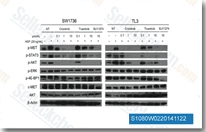
|
|
| S1561 | BMS-777607 | BMS-777607 (BMS 817378) is a Met-related inhibitor for c-Met, Axl, Ron and Tyro3 with IC50 of 3.9 nM, 1.1 nM, 1.8 nM and 4.3 nM in cell-free assays, 40-fold more selective for Met-related targets versus Lck, VEGFR-2, and TrkA/B, and more than 500-fold greater selectivity versus all other receptor and non receptor kinases. |
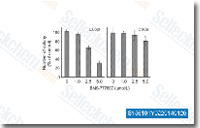
|
|
| S1114 | JNJ-38877605 | JNJ-38877605 is an ATP-competitive inhibitor of c-Met with IC50 of 4 nM, 600-fold selective for c-Met than 200 other tyrosine and serine-threonine kinases. Phase 1. |
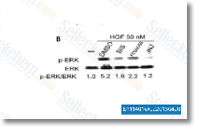
|
|
| S1124 | BMS-754807 | BMS-754807 is a potent and reversible inhibitor of IGF-1R/InsR with IC50 of 1.8 nM/1.7 nM in cell-free assays, less potent to Met (c-Met), Aurora A/B, TrkA/B and Ron, and shows little activity to Flt3, Lck, MK2, PKA, PKC etc. Phase 2. |
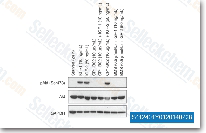
|
|
| S2753 | Tivantinib | Tivantinib is the first non-ATP-competitive c-Met inhibitor with Ki of 0.355 μM in a cell-free assay, little activity to Ron, and no inhibition to EGFR, InsR, PDGFRα or FGFR1/4. Tivantinib (ARQ 197) induces a G2/M arrest and apoptosis. |
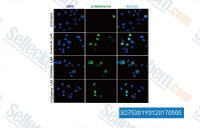
|
|
| S1094 | PF-04217903 | PF-04217903 is a selective ATP-competitive c-Met inhibitor with IC50 of 4.8 nM in A549 cell line, susceptible to oncogenic mutations (no activity to Y1230C mutant). Phase 1. |
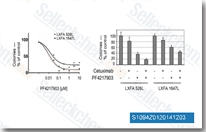
|
|
| S1244 | Amuvatinib (MP-470) | Amuvatinib (MP-470, HPK 56) is a potent and multi-targeted inhibitor of c-Kit, PDGFRα and Flt3 with IC50 of 10 nM, 40 nM and 81 nM, respectively. Amuvatinib suppresses c-MET and c-RET. Amuvatinib is also active as a DNA repair protein Rad51 inhibitor with antineoplastic activity. Phase 2. |
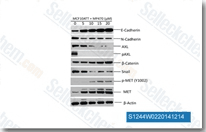
|
|
| S7067 | Tepotinib | Tepotinib is a potent and selective c-Met inhibitor with IC50 of 4 nM, >200-fold selective for c-Met than IRAK4, TrkA, Axl, IRAK1, and Mer. Tepotinib (EMD 1214063) induces autophagy. Phase 1. |
-S706701Z0220150917.gif)
|
|
| S7674 | Savolitinib (AZD6094) | Savolitinib (Volitinib, AZD6094, HMPL-504) is a novel, potent, and selective MET inhibitor currently in clinical development in various indications, including PRCC. The IC50 values of this compound for c-Met and p-Met are 5 nM and 3 nM, respectively. It shows exquisite selectivity for c-Met over 274 kinase. | ||
| S1361 | MGCD-265 analog | MGCD-265 is a potent, multi-target and ATP-competitive inhibitor of c-Met and VEGFR1/2/3 with IC50 of 1 nM, 3 nM/3 nM/4 nM, respectively; also inhibits Ron and Tie2. Phase 1/2. |
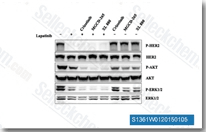
|
|
| S2859 | Golvatinib (E7050) | Golvatinib (E7050) is a dual c-Met and VEGFR-2 inhibitor with IC50 of 14 nM and 16 nM, does not inhibit bFGF-stimulated HUVEC growth (up to 1000 nM). Phase 1/2. |
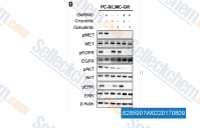
|
|
| S7014 | Merestinib (LY2801653) | Merestinib (LY2801653) is a type-II ATP competitive, slow-off inhibitor of Met (c-Met) tyrosine kinase with a dissociation constant (Ki) of 2 nM, a pharmacodynamic residence time (Koff) of 0.00132 min(-1) and t1/2 of 525 min. Merestinib (LY2801653) also inhibits MST1R, AXL, ROS1, MKNK1/2, FLT3, MERTK, DDR1 and DDR2 with IC50 of 11 nM, 2 nM, 23 nM, 7 nM, 7 nM, 10 nM, 0.1 nM and 7 nM, respectively. | ||
| S9662 | UNC2025 | UNC2025 is a potent and orally active dual inhibitor of FLT3 and MER with IC50 of 0.35 nM and 0.46 nM, respectively. UNC2025 also inhibits AXL, TRKA, TRKC, QIK, TYRO3, SLK, NuaK1, Kit (c-Kit) and Met (c-Met) with IC50 of 1.65 nM, 1.67 nM, 4.38 nM, 5.75 nM, 5.83 nM, 6.14 nM, 7.97 nM, 8.18 nM and 364 nM, respectively. | ||
| S8570 | CEP-40783 (RXDX-106) | CEP-40783 (RXDX-106) is an orally-available, potent and selective TAM(TYRO3, AXL, MER)/Met (c-Met) inhibitor displaying low nanomolar biochemical activity and slow (T1/2 >120 min) inhibitor off-rate in peptide phosphorylation assays and in vitro kinase binding assays, respectively. | ||
| S2774 | MK-2461 | MK-2461 is a potent, multi-targeted inhibitor for c-Met(WT/mutants) with IC50 of 0.4-2.5 nM, less potent to Ron, Flt1; 8- to 30-fold greater selectivity of c-Met targets versus FGFR1, FGFR2, FGFR3, PDGFRβ, KDR, Flt3, Flt4, TrkA, and TrkB. Phase 1/2. |
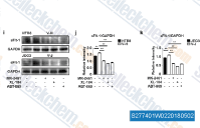
|
|
| S7669 | NPS-1034 | NPS-1034 is a dual Met (c-Met)/Axl inhibitor with IC50 of 48 nM and 10.3 nM, respectively. | ||
| S8167 | AMG 337 | AMG 337 is an oral, small molecule, ATP-competitive, highly selective inhibitor of the Met (c-Met) receptor with an IC50 of 1 nM. | ||
| S3759 | Norcantharidin | Norcantharidin (Endothall anhydride) is a synthetic anticancer compound which is a dual inhibitor for c-Met and EGFR in human colon cancers. | ||
| S6412 | Altiratinib | Altiratinib (DCC-2701) is a potent single-digit nanomolar inhibitor of TRK, Met (c-Met), TIE2, and VEGFR2 kinases with IC50 vaules of 0.9 nM, 4.6 nM, and 0.8 nM for TRKA, B, and C, respectively. It inhibits Met (c-Met) and Met (c-Met) mutant with IC50 values in the range of 0.3-6 nM. | ||
| S5115 | Sodium L-ascorbyl-2-phosphate | Sodium L-ascorbyl-2-phosphate (Sodium ascorbyl monophosphate, Sodium ascorbyl phosphate, SAP) is specifically produced for use as a stabilized source of vitamin C in cosmetic products. It is used in skin care recipes for UV protection, collagen production, as an antioxidant and for its skin lightening and brightening effects. Sodium L-ascorbyl-2-phosphate (2-Phospho-L-ascorbic acid trisodium salt, L-Ascorbic acid 2-phosphate trisodium salt, Sodium ascorbyl phosphate, SAP) is a selective antioxidant and a stimulator of hepatocyte growth factor (HGF) production. | ||
| S2201 | BMS-794833 | BMS-794833 is a potent ATP competitive inhibitor of Met (c-Met)/VEGFR2 with IC50 of 1.7 nM/15 nM, also inhibits Ron, Axl and Flt3 with IC50 of <3 nM; a prodrug of BMS-817378. Phase 1. | ||
| S2761 | NVP-BVU972 | NVP-BVU972 is a selective and potent Met (c-Met) inhibitor with IC50 of 14 nM. | ||
| S8404 | S49076 | S49076 is a novel, potent inhibitor of Met (c-Met), AXL/MER, and FGFR1/2/3 with IC50 values below 20 nmol/L. | ||
| S1316 | AMG-208 | AMG 208 is a highly selective dual c-Met and RON inhibitor with IC50 of 9 nM for c-Met. | ||
| S2747 | AMG-458 | AMG 458 is a potent c-Met inhibitor with Ki of 1.2 nM, ~350-fold selectivity for c-Met than VEGFR2 in cells. | ||
| S6899 | Licochalcone D | Licochalcone D (Lico D, LCD, LD), a flavonoid isolated from a Chinese medicinal plant Glycyrrhiza inflata, has antioxidant, anti-inflammatory and anti-cancer properties. Licochalcone D inhibit phosphorylation of NF-κB p65 in LPS signaling pathway. Licochalcone D inhibits JAK2, EGFR and Met (c-Met) activities and induces ROS-dependent apoptosis. Licochalcone D also induces caspases activation and poly (ADP-ribose) polymerase (PARP) cleavage. | ||
| E4606New | Dihexa | Dihexa(PNB-0408), an oligopeptide drug, is an orally active and blood-brain barrier-permeable analog of angiotensin IV. It binds to hepatocyte growth factor (HGF) with high affinity and potentiates its activity at its receptor, c-Met. Dihexa can also be used as a therapeutic potential in the treatment of Alzheimer’s disease. | ||
| S0540 | BAY-474 | BAY-474 is an inhibitor of tyrosine-protein kinase c-Met and can act as an epigenetics probe. | ||
| S8854 | JNJ-38877618(OMO-1) | JNJ-38877618 (OMO-1) is a potent, highly selective, orally bioavailable Met (c-Met) kinase inhibitor with binding affinity (Kd) of 1.4 nM and enzyme inhibitory activity against wt and M1268T mutant Met (c-Met) (2 and 3 nM IC50). | ||
| S9620 | Elzovantinib (TPX-0022) | Elzovantinib (TPX-0022, CSF1R-IN-2) is a potent inhibitor of MET/CSF1R/SRC with enzymatic kinase inhibition IC50s of 0.14 nM, 0.71 nM and 0.12 nM, respectively. TPX-0022 modulates the tumor immune microenvironment in preclinical models. | ||
| A2467 | Telisotuzumab (Anti-HGFR / c-Met) | Telisotuzumab (Anti-HGFR / c-Met) is a monoclonal antibody that targets c-Met. MW: 145.64 KD. | ||
| A2468 | Onartuzumab (Anti-HGFR / c-Met) | Onartuzumab (Anti-HGFR / c-Met) is a unique, humanized and affinity-matured monovalent (one-armed) monoclonal antibody against the MET receptor. Onartuzumab potently inhibits HGF binding and receptor phosphorylation and signaling. Onartuzumab has antibody-like pharmacokinetics and antitumor activity. MW: 144.64 KD. | ||
| A2469 | Rilotumumab (Anti-HGF / SF) | Rilotumumab (Anti-HGF / SF) is a monoclonal antibody that inhibits HGF/MET-driven signaling. Rilotumumab shows anti-tumor activity, and can be used in castration-resistant prostate cancer (CRPC) and solid tumor research. MW: 145.5 KD. | ||
| A2661 | Ficlatuzumab (Anti-HGF / SF) | Ficlatuzumab (Anti-HGF / SF) is a monoclonal antibody (McAb) targeting human hepatocyte growth factor (HGF). It inhibits c-Met receptor-mediated cancer cell proliferation, migration, and invasion and can be used to treat head and neck squamous cell carcinoma (HNSCC). MW :150 KD. | ||
| A2662 | Emibetuzumab (Anti-HGFR / c-Met) | Emibetuzumab (Anti-HGFR / c-Met) is a humanized bivalent MET antibody targeting both HGF-dependent and HGF-independent MET pathway activation and tumor growth. It can be used in study of cancer. MW :144.56 KD. | ||
| S9308 | Pulsatilla saponin D | Pulsatilla saponin D (SB365), isolated from the root of Pulsatilla koreana, targets c-Met and exerts antiangiogenic and antitumor activities. | ||
| S6870 | Ningetinib | Ningetinib (CT-053, DE-120, CT053PTSA) is a potent, orally bioavailable inhibitor of tyrosine kinase with IC50 of 6.7 nM, 1.9 nM and <1.0 nM for c-Met, VEGFR2 and Axl, respectively. Ningetinib exhibits antitumor activity. | ||
| S0361 | AMG-1 | AMG-1 (c-Met/RON Dual Kinase Inhibitor, RON-IN-1) is a potent inhibitor of human c-Met and RON with IC50 of 4 nM and 9 nM, respectively. | ||
| A2930 | Anti-HGF / SF (TAK-701) | Anti-HGF / SF (TAK-701) is a humanized monoclonal antibody directed against human hepatocyte growth factor (HGF) with potential antineoplastic activity. It reverses gefitinib resistance in non-small-cell lung cancer. MW: 145.04 KD. | ||
| A2932 | Anti-HGFR / c-Met (SAIT301) | Anti-HGFR / c-Met (SAIT301) is a humanized monoclonal antibody targeting the alpha chain of the extracellular domain of the human hepatocyte growth factor receptor (HGFR or c-Met) with potential antineoplastic activity. MW: 146.0 KD. | ||
| S6762 | Bozitinib | Bozitinib is a highly selective ATP-competitive c-Met inhibitor with blood-brain barrier permeability. Bozitinib (PLB-1001) selectively inhibits MET-altered tumor cells in preclinical models. | ||
| S6764 | Pamufetinib (TAS-115) | Pamufetinib (TAS-115) is a highly potent c-Met and VEGFR dual inhibitor with IC50s of 30 nM and 32 nM for recombinant VEGFR2 and recombinant MET, respectively. | ||
| E2655 | Terevalefim | Terevalefim (ANG-3777), a small molecule hepatocyte growth factor (HGF) mimetic, induces c-MET dimerization and phosphorylation, reducing apoptosis and increasing cellular proliferation. | ||
| S7564 | SAR125844 | SAR125844 is a potent intravenously active and highly selective Met (c-Met) kinase inhibitor, displaying nanomolar activity against the wild-type kinase (IC50 value of 4.2 nmol/L) and H1094Y, Y1235D, M1250T, L1195V, and D1228H kinase domain mutants (IC50 values of 0.22, 1.7, 6.5, 65, and 81 nmol/L, respectively). | ||
| E4914New | Cabozantinib hydrochloride | Cabozantinib hydrochloride(XL184, BMS-907351 hydrochloride) is a potent small-molecule kinase inhibitor of c-MET and VEGFR2 with an IC50 of 1.3 nM, 0.035 nM respectively. It also inhibits RET, KIT, AXL, Tie2 and FLT3 with an IC50's of 5.2 nM, 4.6 nM, 7 nM, 14.3 nM, 11.3nM respectively. It can be promising agent for inhibiting tumor angiogenesis and metastasis in cancers with dysregulated MET and VEGFR signaling. | ||
| E1340New | Glesatinib | Glesatinib(MGCD265) is an orally bioavailable potent dual inhibitor of c-MET and SMO. Glesatinib counteracts P-glycoprotein (P-gp) mediated multidrug resistance (MDR) in non-small cell lung cancer (NSCLC). | ||
| S8676 | Glumetinib | Glumetinib is a potent and highly selective c-Met inhibitor with an IC50 of 0.42 ± 0.02 nmol/L. Glumetinib has greater than 2,400-fold selectivity for c-Met over those 312 kinases evaluated, including the c-Met family member RON and highly homologous kinases Axl, Mer, and TyrO3. | ||
| D4046 | Telisotuzumab vedotin | Telisotuzumab vedotin (Teliso-V, ABBV-399) is an antibody-drug conjugate (ADC) composed of the anti–c-Met humanized monoclonal antibody coupled to the cytotoxic monomethyl auristatin E (MMAE) through a mc-val-cit-PABC type linker. Telisotuzumab vedotin can be used for research on advanced solid tumours. | ||
| E0142 | XL092 | XL092 (JUN04542) is an ATP-competitive inhibitor of multiple RTKs including MET, VEGFR2, AXL and MER, with IC50 values of 15 nM, 1.6 nM, 3.4 nM, and 7.2 nM in cell-based assays, respectively. |
||
| S1068 | Crizotinib | Crizotinib is a potent inhibitor of c-Met and ALK with IC50 of 11 nM and 24 nM in cell-based assays, respectively. It is also a potent ROS1 inhibitor with Ki value less than 0.025 nM. Crizotinib induces autophagy through inhibition of the STAT3 pathway in multiple lung cancer cell lines. |

|
|
| S1119 | Cabozantinib (XL184) | Cabozantinib (XL184) is a potent VEGFR2 inhibitor with IC50 of 0.035 nM and also inhibits c-Met, Ret, Kit, Flt-1/3/4, Tie2, and AXL with IC50 of 1.3 nM, 4 nM, 4.6 nM, 12 nM/11.3 nM/6 nM, 14.3 nM and 7 nM in cell-free assays, respectively. Cabozantinib induces PUMA-dependent apoptosis in colon cancer cells via AKT/GSK-3β/NF-κB signaling pathway. |

|
|
| S1112 | SGX-523 | SGX-523 is a selective Met (c-Met) inhibitor with IC50 of 4 nM, no activity to BRAFV599E, c-Raf, Abl and p38α. Phase 1. |
3.">

|
|
| S4001 | Cabozantinib malate | Cabozantinib malate (XL184) is the malate of Cabozantinib, a potent VEGFR2 inhibitor with IC50 of 0.035 nM and also inhibits c-Met, Ret (c-Ret), Kit (c-Kit), Flt-1/3/4, Tie2, and AXL with IC50 of 1.3 nM, 4 nM, 4.6 nM, 12 nM/11.3 nM/6 nM, 14.3 nM and 7 nM in cell-free assays, respectively. Cabozantinib malate (XL184) induces apoptosis. |

|
|
| S1111 | Foretinib | Foretinib is an ATP-competitive inhibitor of HGFR and VEGFR, mostly for Met (c-Met) and KDR with IC50 of 0.4 nM and 0.9 nM in cell-free assays. Less potent against Ron, Flt-1/3/4, Kit (c-Kit), PDGFRα/β and Tie-2, and little activity to FGFR1 and EGFR. Phase 2. |

|
|
| S1070 | PHA-665752 | PHA-665752 is a potent, selective and ATP-competitive c-Met inhibitor with IC50 of 9 nM in cell-free assays, >50-fold selectivity for c-Met than RTKs or STKs. |

|
|
| S2788 | Capmatinib | Capmatinib is a novel, ATP-competitive inhibitor of c-MET with IC50 of 0.13 nM in a cell-free assay, inactive against RONβ, as well as EGFR and HER-3. Capmatinib (INCB28060) inhibits Wnt/β-catenin and EMT signaling pathways and induces apoptosis in diffuse gastric cancer positive for c-MET amplification. Phase 1. |

|
|
| S5190 | Crizotinib hydrochloride | Crizotinib (PF-02341066) hydrochloride (Xalkori) inhibits tyrosine phosphorylation of c-Met and nucleophosmin (NPM)-anaplastic lymphoma kinase (ALK) with IC50 of of 11 nM and 24 nM in cell-based assays, respectively. Crizotinib hydrochloride is also a potent ROS1 inhibitor with Ki less than 0.025 nM. Crizotinib induces autophagy through inhibition of the STAT3 pathway in multiple lung cancer cell lines. | ||
| S1080 | SU11274 | SU11274 (PKI-SU11274) is a selective Met (c-Met) inhibitor with IC50 of 10 nM in cell-free assays, no effects on PGDFRβ, EGFR or Tie2. SU11274 induces autophagy, apoptosis and cell cycle arrest. |

|
|
| S1561 | BMS-777607 | BMS-777607 (BMS 817378) is a Met-related inhibitor for c-Met, Axl, Ron and Tyro3 with IC50 of 3.9 nM, 1.1 nM, 1.8 nM and 4.3 nM in cell-free assays, 40-fold more selective for Met-related targets versus Lck, VEGFR-2, and TrkA/B, and more than 500-fold greater selectivity versus all other receptor and non receptor kinases. |

|
|
| S1114 | JNJ-38877605 | JNJ-38877605 is an ATP-competitive inhibitor of c-Met with IC50 of 4 nM, 600-fold selective for c-Met than 200 other tyrosine and serine-threonine kinases. Phase 1. |

|
|
| S1124 | BMS-754807 | BMS-754807 is a potent and reversible inhibitor of IGF-1R/InsR with IC50 of 1.8 nM/1.7 nM in cell-free assays, less potent to Met (c-Met), Aurora A/B, TrkA/B and Ron, and shows little activity to Flt3, Lck, MK2, PKA, PKC etc. Phase 2. |

|
|
| S2753 | Tivantinib | Tivantinib is the first non-ATP-competitive c-Met inhibitor with Ki of 0.355 μM in a cell-free assay, little activity to Ron, and no inhibition to EGFR, InsR, PDGFRα or FGFR1/4. Tivantinib (ARQ 197) induces a G2/M arrest and apoptosis. |

|
|
| S1094 | PF-04217903 | PF-04217903 is a selective ATP-competitive c-Met inhibitor with IC50 of 4.8 nM in A549 cell line, susceptible to oncogenic mutations (no activity to Y1230C mutant). Phase 1. |

|
|
| S1244 | Amuvatinib (MP-470) | Amuvatinib (MP-470, HPK 56) is a potent and multi-targeted inhibitor of c-Kit, PDGFRα and Flt3 with IC50 of 10 nM, 40 nM and 81 nM, respectively. Amuvatinib suppresses c-MET and c-RET. Amuvatinib is also active as a DNA repair protein Rad51 inhibitor with antineoplastic activity. Phase 2. |

|
|
| S7067 | Tepotinib | Tepotinib is a potent and selective c-Met inhibitor with IC50 of 4 nM, >200-fold selective for c-Met than IRAK4, TrkA, Axl, IRAK1, and Mer. Tepotinib (EMD 1214063) induces autophagy. Phase 1. |
-S706701Z0220150917.gif)
|
|
| S7674 | Savolitinib (AZD6094) | Savolitinib (Volitinib, AZD6094, HMPL-504) is a novel, potent, and selective MET inhibitor currently in clinical development in various indications, including PRCC. The IC50 values of this compound for c-Met and p-Met are 5 nM and 3 nM, respectively. It shows exquisite selectivity for c-Met over 274 kinase. | ||
| S1361 | MGCD-265 analog | MGCD-265 is a potent, multi-target and ATP-competitive inhibitor of c-Met and VEGFR1/2/3 with IC50 of 1 nM, 3 nM/3 nM/4 nM, respectively; also inhibits Ron and Tie2. Phase 1/2. |

|
|
| S2859 | Golvatinib (E7050) | Golvatinib (E7050) is a dual c-Met and VEGFR-2 inhibitor with IC50 of 14 nM and 16 nM, does not inhibit bFGF-stimulated HUVEC growth (up to 1000 nM). Phase 1/2. |

|
|
| S7014 | Merestinib (LY2801653) | Merestinib (LY2801653) is a type-II ATP competitive, slow-off inhibitor of Met (c-Met) tyrosine kinase with a dissociation constant (Ki) of 2 nM, a pharmacodynamic residence time (Koff) of 0.00132 min(-1) and t1/2 of 525 min. Merestinib (LY2801653) also inhibits MST1R, AXL, ROS1, MKNK1/2, FLT3, MERTK, DDR1 and DDR2 with IC50 of 11 nM, 2 nM, 23 nM, 7 nM, 7 nM, 10 nM, 0.1 nM and 7 nM, respectively. | ||
| S9662 | UNC2025 | UNC2025 is a potent and orally active dual inhibitor of FLT3 and MER with IC50 of 0.35 nM and 0.46 nM, respectively. UNC2025 also inhibits AXL, TRKA, TRKC, QIK, TYRO3, SLK, NuaK1, Kit (c-Kit) and Met (c-Met) with IC50 of 1.65 nM, 1.67 nM, 4.38 nM, 5.75 nM, 5.83 nM, 6.14 nM, 7.97 nM, 8.18 nM and 364 nM, respectively. | ||
| S8570 | CEP-40783 (RXDX-106) | CEP-40783 (RXDX-106) is an orally-available, potent and selective TAM(TYRO3, AXL, MER)/Met (c-Met) inhibitor displaying low nanomolar biochemical activity and slow (T1/2 >120 min) inhibitor off-rate in peptide phosphorylation assays and in vitro kinase binding assays, respectively. | ||
| S2774 | MK-2461 | MK-2461 is a potent, multi-targeted inhibitor for c-Met(WT/mutants) with IC50 of 0.4-2.5 nM, less potent to Ron, Flt1; 8- to 30-fold greater selectivity of c-Met targets versus FGFR1, FGFR2, FGFR3, PDGFRβ, KDR, Flt3, Flt4, TrkA, and TrkB. Phase 1/2. |

|
|
| S7669 | NPS-1034 | NPS-1034 is a dual Met (c-Met)/Axl inhibitor with IC50 of 48 nM and 10.3 nM, respectively. | ||
| S8167 | AMG 337 | AMG 337 is an oral, small molecule, ATP-competitive, highly selective inhibitor of the Met (c-Met) receptor with an IC50 of 1 nM. | ||
| S3759 | Norcantharidin | Norcantharidin (Endothall anhydride) is a synthetic anticancer compound which is a dual inhibitor for c-Met and EGFR in human colon cancers. | ||
| S6412 | Altiratinib | Altiratinib (DCC-2701) is a potent single-digit nanomolar inhibitor of TRK, Met (c-Met), TIE2, and VEGFR2 kinases with IC50 vaules of 0.9 nM, 4.6 nM, and 0.8 nM for TRKA, B, and C, respectively. It inhibits Met (c-Met) and Met (c-Met) mutant with IC50 values in the range of 0.3-6 nM. | ||
| S2201 | BMS-794833 | BMS-794833 is a potent ATP competitive inhibitor of Met (c-Met)/VEGFR2 with IC50 of 1.7 nM/15 nM, also inhibits Ron, Axl and Flt3 with IC50 of <3 nM; a prodrug of BMS-817378. Phase 1. | ||
| S2761 | NVP-BVU972 | NVP-BVU972 is a selective and potent Met (c-Met) inhibitor with IC50 of 14 nM. | ||
| S8404 | S49076 | S49076 is a novel, potent inhibitor of Met (c-Met), AXL/MER, and FGFR1/2/3 with IC50 values below 20 nmol/L. | ||
| S1316 | AMG-208 | AMG 208 is a highly selective dual c-Met and RON inhibitor with IC50 of 9 nM for c-Met. | ||
| S2747 | AMG-458 | AMG 458 is a potent c-Met inhibitor with Ki of 1.2 nM, ~350-fold selectivity for c-Met than VEGFR2 in cells. | ||
| S6899 | Licochalcone D | Licochalcone D (Lico D, LCD, LD), a flavonoid isolated from a Chinese medicinal plant Glycyrrhiza inflata, has antioxidant, anti-inflammatory and anti-cancer properties. Licochalcone D inhibit phosphorylation of NF-κB p65 in LPS signaling pathway. Licochalcone D inhibits JAK2, EGFR and Met (c-Met) activities and induces ROS-dependent apoptosis. Licochalcone D also induces caspases activation and poly (ADP-ribose) polymerase (PARP) cleavage. | ||
| S0540 | BAY-474 | BAY-474 is an inhibitor of tyrosine-protein kinase c-Met and can act as an epigenetics probe. | ||
| S8854 | JNJ-38877618(OMO-1) | JNJ-38877618 (OMO-1) is a potent, highly selective, orally bioavailable Met (c-Met) kinase inhibitor with binding affinity (Kd) of 1.4 nM and enzyme inhibitory activity against wt and M1268T mutant Met (c-Met) (2 and 3 nM IC50). | ||
| S9620 | Elzovantinib (TPX-0022) | Elzovantinib (TPX-0022, CSF1R-IN-2) is a potent inhibitor of MET/CSF1R/SRC with enzymatic kinase inhibition IC50s of 0.14 nM, 0.71 nM and 0.12 nM, respectively. TPX-0022 modulates the tumor immune microenvironment in preclinical models. | ||
| S9308 | Pulsatilla saponin D | Pulsatilla saponin D (SB365), isolated from the root of Pulsatilla koreana, targets c-Met and exerts antiangiogenic and antitumor activities. | ||
| S6870 | Ningetinib | Ningetinib (CT-053, DE-120, CT053PTSA) is a potent, orally bioavailable inhibitor of tyrosine kinase with IC50 of 6.7 nM, 1.9 nM and <1.0 nM for c-Met, VEGFR2 and Axl, respectively. Ningetinib exhibits antitumor activity. | ||
| S0361 | AMG-1 | AMG-1 (c-Met/RON Dual Kinase Inhibitor, RON-IN-1) is a potent inhibitor of human c-Met and RON with IC50 of 4 nM and 9 nM, respectively. | ||
| S6762 | Bozitinib | Bozitinib is a highly selective ATP-competitive c-Met inhibitor with blood-brain barrier permeability. Bozitinib (PLB-1001) selectively inhibits MET-altered tumor cells in preclinical models. | ||
| S6764 | Pamufetinib (TAS-115) | Pamufetinib (TAS-115) is a highly potent c-Met and VEGFR dual inhibitor with IC50s of 30 nM and 32 nM for recombinant VEGFR2 and recombinant MET, respectively. | ||
| S7564 | SAR125844 | SAR125844 is a potent intravenously active and highly selective Met (c-Met) kinase inhibitor, displaying nanomolar activity against the wild-type kinase (IC50 value of 4.2 nmol/L) and H1094Y, Y1235D, M1250T, L1195V, and D1228H kinase domain mutants (IC50 values of 0.22, 1.7, 6.5, 65, and 81 nmol/L, respectively). | ||
| E4914New | Cabozantinib hydrochloride | Cabozantinib hydrochloride(XL184, BMS-907351 hydrochloride) is a potent small-molecule kinase inhibitor of c-MET and VEGFR2 with an IC50 of 1.3 nM, 0.035 nM respectively. It also inhibits RET, KIT, AXL, Tie2 and FLT3 with an IC50's of 5.2 nM, 4.6 nM, 7 nM, 14.3 nM, 11.3nM respectively. It can be promising agent for inhibiting tumor angiogenesis and metastasis in cancers with dysregulated MET and VEGFR signaling. | ||
| E1340New | Glesatinib | Glesatinib(MGCD265) is an orally bioavailable potent dual inhibitor of c-MET and SMO. Glesatinib counteracts P-glycoprotein (P-gp) mediated multidrug resistance (MDR) in non-small cell lung cancer (NSCLC). | ||
| S8676 | Glumetinib | Glumetinib is a potent and highly selective c-Met inhibitor with an IC50 of 0.42 ± 0.02 nmol/L. Glumetinib has greater than 2,400-fold selectivity for c-Met over those 312 kinases evaluated, including the c-Met family member RON and highly homologous kinases Axl, Mer, and TyrO3. | ||
| E0142 | XL092 | XL092 (JUN04542) is an ATP-competitive inhibitor of multiple RTKs including MET, VEGFR2, AXL and MER, with IC50 values of 15 nM, 1.6 nM, 3.4 nM, and 7.2 nM in cell-based assays, respectively. |
||
| A2467 | Telisotuzumab (Anti-HGFR / c-Met) | Telisotuzumab (Anti-HGFR / c-Met) is a monoclonal antibody that targets c-Met. MW: 145.64 KD. | ||
| A2468 | Onartuzumab (Anti-HGFR / c-Met) | Onartuzumab (Anti-HGFR / c-Met) is a unique, humanized and affinity-matured monovalent (one-armed) monoclonal antibody against the MET receptor. Onartuzumab potently inhibits HGF binding and receptor phosphorylation and signaling. Onartuzumab has antibody-like pharmacokinetics and antitumor activity. MW: 144.64 KD. | ||
| A2469 | Rilotumumab (Anti-HGF / SF) | Rilotumumab (Anti-HGF / SF) is a monoclonal antibody that inhibits HGF/MET-driven signaling. Rilotumumab shows anti-tumor activity, and can be used in castration-resistant prostate cancer (CRPC) and solid tumor research. MW: 145.5 KD. | ||
| A2661 | Ficlatuzumab (Anti-HGF / SF) | Ficlatuzumab (Anti-HGF / SF) is a monoclonal antibody (McAb) targeting human hepatocyte growth factor (HGF). It inhibits c-Met receptor-mediated cancer cell proliferation, migration, and invasion and can be used to treat head and neck squamous cell carcinoma (HNSCC). MW :150 KD. | ||
| A2662 | Emibetuzumab (Anti-HGFR / c-Met) | Emibetuzumab (Anti-HGFR / c-Met) is a humanized bivalent MET antibody targeting both HGF-dependent and HGF-independent MET pathway activation and tumor growth. It can be used in study of cancer. MW :144.56 KD. | ||
| A2930 | Anti-HGF / SF (TAK-701) | Anti-HGF / SF (TAK-701) is a humanized monoclonal antibody directed against human hepatocyte growth factor (HGF) with potential antineoplastic activity. It reverses gefitinib resistance in non-small-cell lung cancer. MW: 145.04 KD. | ||
| A2932 | Anti-HGFR / c-Met (SAIT301) | Anti-HGFR / c-Met (SAIT301) is a humanized monoclonal antibody targeting the alpha chain of the extracellular domain of the human hepatocyte growth factor receptor (HGFR or c-Met) with potential antineoplastic activity. MW: 146.0 KD. | ||
| E4606New | Dihexa | Dihexa(PNB-0408), an oligopeptide drug, is an orally active and blood-brain barrier-permeable analog of angiotensin IV. It binds to hepatocyte growth factor (HGF) with high affinity and potentiates its activity at its receptor, c-Met. Dihexa can also be used as a therapeutic potential in the treatment of Alzheimer’s disease. | ||
| E4914New | Cabozantinib hydrochloride | Cabozantinib hydrochloride(XL184, BMS-907351 hydrochloride) is a potent small-molecule kinase inhibitor of c-MET and VEGFR2 with an IC50 of 1.3 nM, 0.035 nM respectively. It also inhibits RET, KIT, AXL, Tie2 and FLT3 with an IC50's of 5.2 nM, 4.6 nM, 7 nM, 14.3 nM, 11.3nM respectively. It can be promising agent for inhibiting tumor angiogenesis and metastasis in cancers with dysregulated MET and VEGFR signaling. | ||
| E1340New | Glesatinib | Glesatinib(MGCD265) is an orally bioavailable potent dual inhibitor of c-MET and SMO. Glesatinib counteracts P-glycoprotein (P-gp) mediated multidrug resistance (MDR) in non-small cell lung cancer (NSCLC). |
Choose Selective c-Met Inhibitors
c-MetSignaling Pathway

Tags: c-Met inhibition | c-Met cancer | c-Met pathway | c-Met activation | c-Met phosphorylation | c-Met inhibitor clinical trial | c-Met assay | c-Met inhibitor therapy | c-Met inhibitor review







































